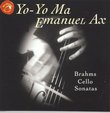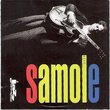| All Artists: Ludwig van Beethoven, David Zinman, Zurich Tonhalle Orchestra Title: Beethoven: Complete Overtures Members Wishing: 1 Total Copies: 0 Label: Arte Nova Classics Original Release Date: 1/1/2005 Re-Release Date: 4/12/2005 Genre: Classical Styles: Ballets & Dances, Ballets, Forms & Genres, Theatrical, Incidental & Program Music, Historical Periods, Classical (c.1770-1830), Symphonies Number of Discs: 1 SwapaCD Credits: 1 UPC: 723721093655 |
Search - Ludwig van Beethoven, David Zinman, Zurich Tonhalle Orchestra :: Beethoven: Complete Overtures
 | Ludwig van Beethoven, David Zinman, Zurich Tonhalle Orchestra Beethoven: Complete Overtures Genre: Classical
"Of course this is what Beethoven is supposed to sound like. All the warmth, the breadth, the depth, the height, the solemnity, the hilarity, the agony, and, of course, the wild-eyed ecstasy that are in Beethoven in these ... more » |
Larger Image |
CD DetailsSynopsis
Album Description "Of course this is what Beethoven is supposed to sound like. All the warmth, the breadth, the depth, the height, the solemnity, the hilarity, the agony, and, of course, the wild-eyed ecstasy that are in Beethoven in these performances of his complete Overtures by David Zinman leading the Tonhalle Orchestre Zurich. As Zinman proved in his cycle of the nine symphonies, he knows Beethoven, knows his music and his moods, knows when to hold back and when to let loose, when to dance and when to sing in blissful rapture. In his cycle of the 11 overtures, Zinman soars with Die Geschöpfe des Prometheus, rails with Egmont, roars with Coriolan, and laughs with König Stephen. Zinman is as heroic as Fidelio, as passionate as Leonore, and as countrapuntally intoxicated as Die Weihe des Hauses. The Tonhalle Orchestre, which showed itself an adept and powerful Beethoven orchestra in the symphonies, once again shows its colors, its strength, and its tenderness in the overtures. ! Arte Nova?s sound is deep, lush, and real."-ALL MUSIC GUIDE Similarly Requested CDs
|
CD ReviewsMuch-needed fresh interpretation of the overtures chefdevergue | Spokane, WA United States | 06/11/2005 (5 out of 5 stars) "Surprisingly, there are relatively few choices currently available when it comes to complete collections of the Beethoven overtures, long part of the standard repetoire of any respectable orchestra. The Masur/Leipzig collection has been around for about 30 years, but until Zinman's collection was released this year, it has been pretty slim pickings. At first, I did not know quite what to think, because Zinman offers a much leaner, fast-paced interpretation of nearly every overture. On average, his tempi are over a minute faster than the more traditional tempi of Masur's, which means that the Tonhalle Orchestra is really on a brisk clip. The orchestra's sound is also considerably lighter than one might expect (unless you are dealing with Gardiner & his period instruments, who have not yet recorded the overtures as far as I know). Whether this a result of reduced personnel or careful mike placement, I don't know, but the result is a much less heavy sound than what normally hears. Initially, I did not care for what I found to be unfamiliar, but the more I listened, the more Zinman's tempi made sense and the more accessible these overtures became. Also (unlike Masur's edition), the three Leonore overtures do not run consecutively which is to the overall benefit of the collection. There are occasional moments of weakness in the horns & the violins, but they are brief and do not particularly detract from the performances. The recording appears to be a little bass-heavy at times, but not oppressively so; most of the time the sound has a light freshness to it that is most pleasing to the ear. It also doesn't hurt that Arte Nova has made these CDs dirt-cheap. A mediocre performance for this little money could be easily forgiven; it is made all the better that these performances are top-notch. Anyone who loves Beethoven overtures (and who doesn't?) would be mad to overlook this collection." Old (but Very Fine) Wine, New Skins--A Revelatory Listening M. C. Passarella | Lawrenceville, GA | 11/21/2005 (5 out of 5 stars) "Beethoven's great overtures need no special pleading, and yet David Zinman gets down so effectively to where this music lives that in some cases, it is like hearing a thrice-familiar work for the first time. Even the Zur Namensfeier Overture, easily the least distinguished of the pieces collected here, has both sparkle and bite in Zinman's reading. The similar but much finer King Stephen Overture is always a smile-inducing surprise among Beethoven's dramatically charged overtures, given its simple joviality. Here it smiles with a youthful freshness that you don't hear in every interpretation. The most revelatory performance for me, though, is of the Coriolan Overture, a darkly brooding piece that usually seems a bit dour despite its obvious craftsmanship and the undying memorability of its poignant second melody. Zinman succeeds in bringing out the fiery drama in this piece, which seems more often to smolder than to burn outright. Zinman's is a truly captivating performance and will be the way I choose to hear this wonderful work from now on. Another piece that can seem pedantic and overwrought, The Consecration of the House Overture, is in Zinman's hands perfectly proportioned. Here as elsewhere, Zinman is faster than a lot of conductors but without sacrificing any of the grandiosity of this very grand piece. The one place where I'd say he rushes things too much is in the slow introduction to Egmont: the "quasi allegro" at which he takes the opening fails to provide contrast to the true allegro that is to follow. A small misstep given the many, many felicities of this set. Overall, in fact, it should let you hear these tried-and-true masterworks with a new set of ears. In writing of Zinman's Beethoven Symphonies series, some critics have complained that the Tonhalle Orchestra produces an anemic sound. I don't hear evidence of that on these discs. There is real heft in the lower strings at the start of the Zur Namensfeier and Egmont Overtures, and the consciously "big" pieces such as the Leonore 2 and 3 and The Consecration of the House Overtures have a proper Beethovenian robustness. Sometimes, I'd say, the horns sound overtaxed, but just as often they produce a blaze of glory for Zinman. So I can't find any great objection to the playing of this mostly very fine orchestra. I also like the sound the engineers have captured in the lively Tonhalle. It provides depth as well as detail: there is sheen to the high strings; punch and heft to the brass, timpani, lower strings. In fact, I like just about everything these discs have to offer, including their super bargain price." Wonderfully fresh Prescott Cunningham Moore | 06/06/2007 (5 out of 5 stars) "David Zinman and his Tonhalle Orchestra of Zurich deliver what is, hands down, the best overture to the Ruins of Athens on disc. Zinman opens the work with great energy at a quick tempo - those of us familiar with Masur's slow and stately introduction will certainly feel as if they are hearing this familiar music for the first time. The oboe cadenza is delightfully zippy as Zinman plunges headlong into the allegro proper with such authoritative vitality that one almost feels foolish for not liking this work more, slight though it is on musical argument. Horns wail, strings dig, and winds bite in this marvelous traversal. This performance gave me several impressions. First, how nice it is to hear Beethoven (here and in his traversal of the symphonies) with smaller forces married to historically informed performance practices - hard mallets for the timpani, violins divided stereophonically, winds forwardly balanced. It has a tremendous amount of textual clarity which enhances the musical argument in no small part. Secondly, how impressive that even two hundred years after some of these pieces were composed they can still be played to the hilt with fresh energy and conviction. Even with the reduced string section, I would be curious if anyone could find other versions of these overtures with this much vigor. And finally, as always, its wonderful to hear a music director and his orchestra bring something new to familiar music, all the while maintaining the highest performance and musical standard. And the love both Zinman and the Tonhalle have for this music is immediately palpable.
The same level of energy Zinman brings to The Ruins of Athens runs throughout the entirety of this two-disc release. Prometheus certainly benefits from the scaled-down proportions of the orchestra, finding the perfect balance between classical grace and Beethoven's rougher energy. Coriolan is just as bit as convincing, free from the overly-romanticized patina that this work has amassed over the years. The Overture in C receives a particularly convincing interpretation. Listen to how Zinman maintains tension throughout the overly-repetitive music and certainly makes the most sense out of the often odd-sounding scales at near the end of the piece. It just goes to show that even less convincing works can sound convincing when played with this level of conviction. Fidelio is another winner, a performance of lively grace but imbued with appropriate power. The Consecration of the House is a delight. Zinman shapes a cogent and appropriately Baroque sounding opening to the piece and, although the trumpets are a bit reticent in their fanfares, the textual clarity of it all is quite refreshing. The allegro certainly benefits from the antiphonal violin placement, a reading of uncanny transparency, culminating in a roaring conclusion. I still have the slightest preference for Masur's performance and no one can match Charles Munch's Boston Symphony reference interpretation in this work, but all in all it is simply a matter of taste and certainly Zinman offers steep competition. Zinman's reading of King Stephen is one of balanced, proportional energy befitting its classical nature but, when all is said and done, I still prefer Szell's all-or-nothing Cleveland traversal, which possesses unbelievable physicality. As for the three Lenore Overtures, Zinman's approaches are period appropriate, but it is slightly difficult to listen to Lenore No. 3 in this leaner state. I still prefer Gunter Wand's performance, one of almost excessive weight and physicality, but the excitement is unquestionable. Egmont again is wonderful, but seems slightly undernourished when compared to the competition. But preferences aside, Zinman's interpretations are as convincing as ever and offer tremendous musical nourishment. Recorded sound is excellent throughout but the microphone placement seems to differ from work to work. In the performances where the orchestra is most distant, the horns can often sound recessed and slightly pinched (such as in Prometheus and Fidelio) or the timpani overly reverberant (Overture in C). Still, the playing is uniformly spectacular and these are small quips that in no way detract from the listening experience and become less noticeable after repeated outings. This set is certainly a welcome addition to a field that, until now, had virtually no competition. That Masur's performances were uniformly splendid made the dearth of great Beethoven Overture compilations less frustrating, but this set, in modern sound with period performance techniques, is almost self-recommending. Comparing Masur to Zinman seems unfair as both offer so much and say such individual things that I could not imagine having one over the other. This is a welcome addition to the catalog, one that no Beethoven fan should be without." |

 Track Listings (6) - Disc #1
Track Listings (6) - Disc #1








